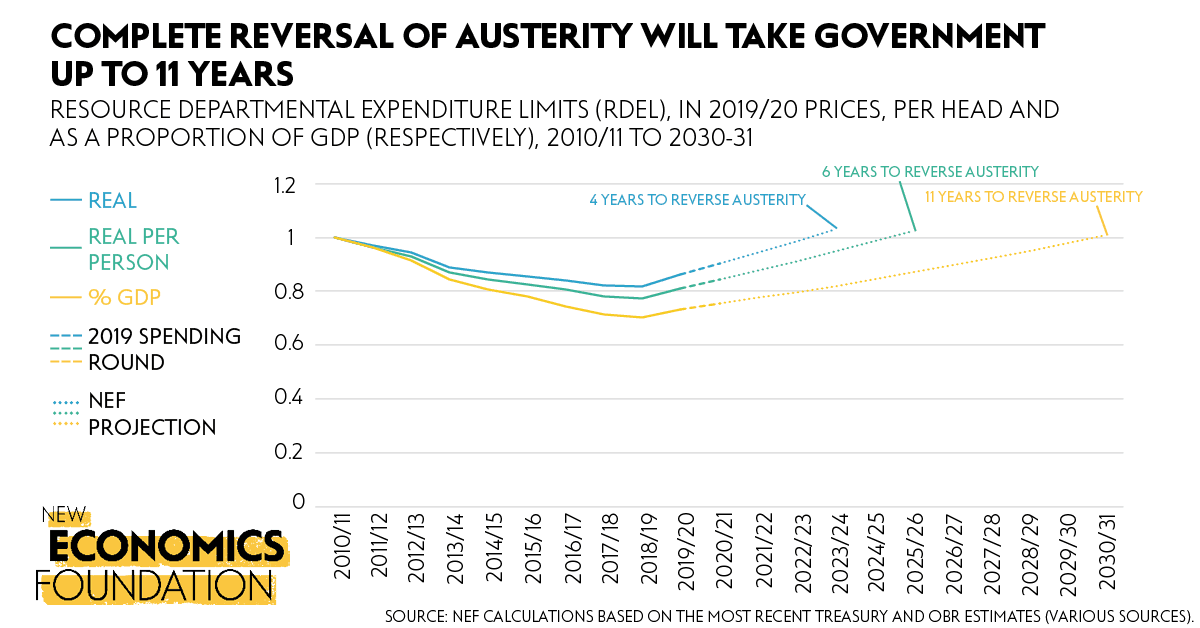It will take up to 11 years for the Government to reverse austerity
New NEF analysis shows that it will take between one and two parliaments to reverse austerity completely at current rate
04 September 2019
At the Spending Review today the Government said that it was “turning the page” on austerity. But new analysis from the New Economics Foundation shows that at the current rate of change, it will take between 4 and 11 years to return departmental spending to 2010/11 levels, depending on the definition of like-for-like departmental spending.
The Chancellor’s announcements today amount to a 6.5% increase in day-to-day spending by departments, before accounting for inflation. The new analysis assumed that this rate of increase is maintained every year, and calculates the new levels of spending in real terms, per head of the population and as a proportion of GDP using the latest forecasts from the OBR.
The analysis shows that it will take almost a full parliament to reverse austerity in real terms (just taking into account inflation). Taking into account inflation and population growth means a full reversal will take 6 years. And to fully reverse the impacts of austerity as a percentage of GDP will take 11 years.

Sarah Arnold, Senior Economist at the New Economics Foundation, said:
“The Prime Minister has said this will be the most ambitious Spending Review for a decade – this is true, but it needs to be considered in the context of 10 years of harmful austerity policies.
“With the effects of political disillusionment and environmental change already leaving their mark on UK society, the latest Spending Review smacks of far too little, far too late.”
Alfie Stirling, Head of Economics at the New Economics Foundation, said:
“The human impacts of austerity so far have been dire. Whether rising homelessness, frozen benefit payments, overcrowded school classes or excessively long waits in hospital A&E services, the starved ambition and resources of our public realm have touched the lives of almost everyone.
“Today’s Spending Review marks a one-year reprieve from government actions actually making the situation worse. But it represents just a small reversal of the harm already caused.”
Contact
Sofie Jenkinson, sofie.jenkinson@neweconomics.org 07981023031
Notes to Editors
Calculations pertain to day-to-day spending by departments only, known as resource departmental expenditure limits (RDEL). Projections for inflation, GDP and population change have been sourced from the latest OBR forecasts. Were GDP growth to slow compared with the latest forecasts, spending as a proportion of GDP would be expected to return to 2010/11 levels in slightly less than the 11 years currently implied.
NEF’s previous work on austerity and the Spending Review can be found here: Austerity by stealth? The Chancellor’s options for the next Spending Review is available at https://neweconomics.org/2018/09/austerity-by-stealth.
NEF’s calculations about the £100bn cost of austerity can be found here: https://neweconomics.org/2019/02/austerity-is-subduing-uk-economy-by-more-than‑3 – 600-per-household-this-year?token=7DYq0Yv4_zb4qrVn42jskaFV2rjCzFGe
The New Economics Foundation is a charitable think tank. We are wholly independent of political parties and committed to being transparent about how we are funded.
Topics Macroeconomics Public services






